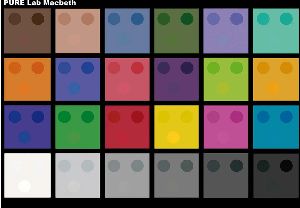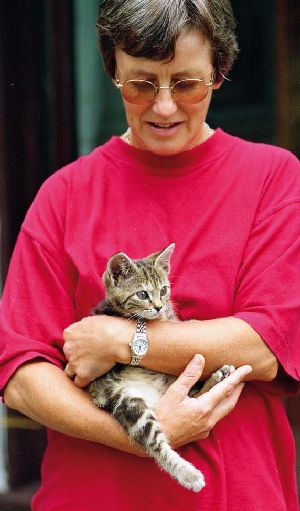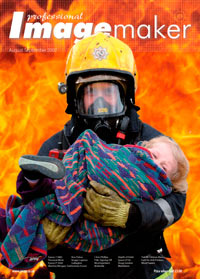articles/Digital/seekingperfection-page2
Seeking Perfection - part 2 of 1 2 3
by Mike McNamee Published 01/08/2007

The underlying Macbeth Chart is a perfect, electronic one. Dots from other scans have been superimposed for comparative purposes.
Reflective Colour Scanning
The reflective set-up previewed in a blistering 4.7 seconds. Such speed is a real boon if you are scanning a multi-page document (eg for OCR) or have a lot of work to scan. An A4 300ppi scan was made in 12s; this again is very nippy.
Scans were made of a Macbeth Chart and then corrected by the scanner software on 'auto' as well as with a bespoke profile made with Monaco profiler. For ease of comparison we have placed the various scan outcomes on in dots, on top of an electronically generated Macbeth Chart, which is arranged as below:
Flat Scan - Auto Exposure
Profiled
The benefits of profiling should be quite apparent even after the combined image has been through the magazine press.
Negative and Positive Transparency Scanning Colour Scanning
To conduct these tests it was necessary to go digging in the archive for materials! One of the things that struck your reviewer looking at scans of 35mm negative colour materials is just how poor these materials are by today's standards - they looked gritty, grainy, clumpy and the colours were all over the place, how anybody can claim they prefer film or (even more outrageously) that film is better than digital is quite a puzzle. We only got back to nice looking images on screen once we got 6x6cm colour negatives. By the time we got around to 6x9cm microscope transparencies the deficiencies in the imaging was just catching up with the scanning. One thing that was striking when processing the photomicrographs (which were 1980 vintage) was just how much improvement could be made in Photoshop with rudimentary levels and sharpening adjustments - they were shot in the days of Apple Macs with 4MB of RAM and 800MB hard drives - happy days! For those who are curious, the top photomicrograph is of aluminium alloy with iron intermetallic impurities (Al19Fe4MnSi2 - that should send a chill down the spines of those who hated chemistry!). These are revealed in so-called 'chinese script' morphology (for reasons that should be apparent). The lower image in Microline Feldspar in crossed-polarised light.
We profiled the V750 for transparency scanning using the IT8 target (one of which is provided with EZcolour) to refine the colour accuracy of the scans considerably. This is a trivially simple procedure with the software and brings the scan neutrals almost to perfection.

A scan from 35mm colour negative.
We scanned a variety of negatives and transparencies and the Epson software proved to be intuitive and easy to use. As ever with negatives, the variation in the required corrections was considerable (although we did choose negatives that were known troublemakers!). For transparencies we tried both un-mounted and mounted materials both with and without Digital ICE. For users with a lot of scans to make, the ability to leave a precious original in its protective mount and let technology do the 'cleaning' is welcome, even if it extends the scan time itself.
Monochrome Scanning
This is an area of activity with which we are quite familiar through Paul Gallagher's regular column. His is one genre which still benefits from the film-scan route. Paul compares in detail, but suffice to say here that the monochrome negative has always been a good test for the prowess of a scanner, especially if it is a negative processed for optimum printing by wet methods (which is true of a lot of archive materials). Paul has been using a V750 for some time now and remains a big fan.
FINAL THOUGHTS
We can see no real downsides to the V750. The Imacon will certainly produce slightly higher quality at much greater speed but at a cost factor of around twenty times - you would need to be doing a lot of scanning before the increased investment would be justified. As a general purpose scanner the V750 will take some beating and should be very near the top of your list if you are in the market for one. see also www.epson.co.uk
Please Note:
There is more than one page for this Article.
You are currently on page 2 Contact Mike McNamee
1st Published 01/08/2007
last update 09/12/2022 14:58:48
More Digital Articles
There are 0 days to get ready for The Society of Photographers Convention and Trade Show at The Novotel London West, Hammersmith ...
which starts on Wednesday 15th January 2025





